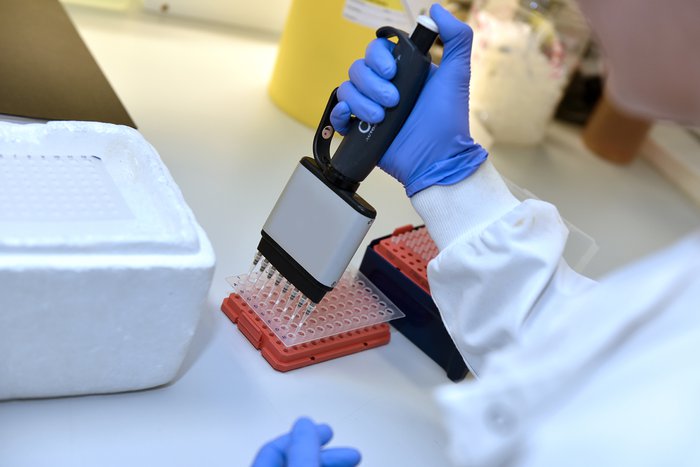New research hope for those with a rare type of leukaemia
Our research fellow, Dr Marc Mansour and his team, have come to understand more about why some types of T-cell acute lymphoblastic leukaemia (T-ALL) stop responding to chemotherapy, and how we might overcome it in the future.

A potential new treatment for people with T-ALL
After years of research, Dr Marc Mansour and his team have shown that a type of drug – which has already shown promise in clinical trials that treat other cancers – could be used as a much needed option for those with T-ALL.
There are more than 100 different types of blood cancer. Some are incredibly rare. Less is known about these rarer diseases. This means there are fewer treatments available to treat them effectively.
This is the case for people with T-ALL, which is a type of blood cancer that affects a white blood cell called a T-cell. ALL affects 700 people a year in the UK, but in most cases, people develop a disease called B-cell ALL – which has more treatments available.
Why is it important to develop new treatments for this disease?
T-ALL affects around 150 children and adults every year in the UK. For some people with this disease, their cancer can stop responding to chemotherapy. This makes it more difficult to treat and requires harsher therapies to get the disease under control, such as bone marrow transplants.
A clue in the genetic instructions of the disease
This new research builds on previous work, which suggested that if T-ALL cancer cells had a change or mutation in a gene called EZH2, people may have a worse outcome than those who didn’t experience this change.
One reason for this is because the cancer is more likely to stop responding to chemotherapy. In this new study, led by Dr Theresa Leon in Dr Mansour’s lab, the team showed that a mutation in EZH2 causes cancer cells to survive and grow in unusual ways. They found that this can be stopped using drugs called CHK1 inhibitors, which could be used to destroy the cancer cells.
A new way to target these cancer cells
The team investigated these drugs in both blood cancer cells in the lab and in mice. They found that when EZH2 was mutated, if the blood cancer was treated with CHK1 inhibitors, then the cancer did not grow as quickly.
Previous research has suggested that CHK1 inhibitors could be used to help those whose cancer had stopped responding to chemotherapy, but it wasn’t clear how to identify who would benefit from these drugs the most. Dr Mansour’s team suggest that studying EZH2 and looking at whether there are changes in this gene, could help to identify people who are living with T-ALL, who would benefit from CHK1 inhibitors.
This research could be used to help design clinical trials using CHK1 inhibitors to treat T-ALL in the future. At the moment, these drugs are showing promise in clinical trials for other cancers. This research could lead to a much needed new treatment option for people with T-ALL.

Worried about anything or have questions?
If you need someone to talk to, please don't hesitate to contact our Support Service by phone or email.
